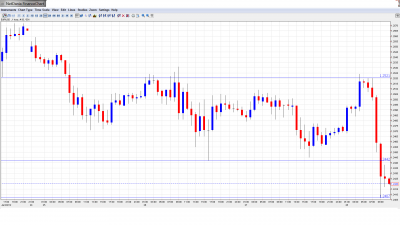EUR/USD broke out of yesterday’s (June 27th) narrow range, as the market mood soured prior to today’s EU Summit. The European leaders have plenty of pressing topics to discuss, starting with the alarming fiscal crises in Greece and Spain. As with other grandiose meetings, there is a lot of skepticism if any concrete measures will be announced. There was more bad news as German CPI and employment figures fell below market estimates. There are several key releases today, including a 10-y bond auction in Italy, and US Unemployment Claims.
Here’s an update on technicals, fundamentals and what’s going on in the markets.
EUR/USD Technicals
- Asian session: Euro/dollar moved upwards, crossing the 1.25 line and reaching a high of 1.2525. The pair then consolidated at 1.2513. Euro/dollar has fallen sharply in the European session, , and was trading at 1.2432.
- Current range: 1.24 to 1.2440.
- Further levels in both directions:
- Below: 1.24, 1.2330, 1.2288, and 1.22.
- Above: 1.2440, 1.2520, 1.2587, 1.2660, 1.2760, 1.2814 and 1.2873, 1.29 and 1.2960.
- The pair broke through 1.2440 as the euro has dropped.
- 1.24 is the next support level. This line has weakened, could be tested if the pair’s downward movement continues.
- 1.2330 is providing strong support.
Euro/Dollar down as markets pessimistic about EU Summit – click on the graph to enlarge.
EUR/USD Fundamentals
- 7:55 German Unemployment Change. Exp. +5K. Actual +7K.
- 7:55 German Unemployment Rate. Exp. 6.7%. Actual 6.8%.
- 8:10 Euro-zone Retail PMI. Actual 48.3 points.
- 9:00 Italian Prelim CPI. Exp. 0.2%. Actual 0.2%.
- All Day: EU Economic Summit.
- Tentative: Italian 10-year Bond Auction.
- 12:30 US Unemployment Claims. Exp. 385K.
- 12:30 US Final GDP. Exp. +1.9%.
- 12:30 US Final GDP Price Index. Exp. +1.7%.
- 14:30 US Natural Gas Storage. Exp. 55B.
- 15:30 US FOMC Member Sandra Pianalto Speaks.
For more events and lines, see the Euro to dollar forecast
EUR/USD Sentiment
- Markets pessemistic about EU Summit: The EU Economic Summit begins today in Brussels, and all 27 EU members will be in attendance. With the Euro-zone in turmoil, one would have thought that it would be prudent on the part of the leaders to announce some tangible steps, to help restore confidence and calm the jittery markets. Instead, a German government official declared that the summit would not result in any detailed decisions and warned against high expectations. Unsurprisingly, the markets reacted poorly, and the euro dropped quickly and sharply as a result. A grandiose meeting with nothing more than rhetoric and photo-ops could send the euro tumbling some more. See 4 reasons to expect a disappointment.
- German releases continue to disappoint: After last week’s disastrous German ZEW Economic Sentiment release, employment figures disappointed the markets. The number of unemployed people rose by seven thousand, exceeding the estimate of five thousand. The unemployment rate came in at 6.8%, above the 6.7% forecast. German Prelim CPI contracted by 0.1%, while the markets had predicted no change in this month’s reading.
- Spain asks for bailout: As expected, Spain sent an official letter in request earlier this week. Yields on Spanish 10 year bonds continue to rise, and our close to an unsustainable 7%. The bailout is unlikely to be a panacea, given the 8 holes in the aid package. Adding to Spain’s woes, the Moody’s ratings agency downgraded 28 Spanish banks earlier this week. The Spanish government is feeling the heat, and has just passed a new law limiting cash transactions.
- Greek government faces tough challenges: The new Greek government finds itself between a rock and a hard place, trying to comply with its bailout obligations while easing the tremendous economic hardships which the Greek populace is facing. The EU, particularly Germany, will have to show some flexibility on the bailout terms and agree to some changes if it is serious about keeping Greece in the EZ. There are discussions of extending the Greek targets, but Greece is likely to miss those as well. The new Greek government is just getting its feet wet, and the last thing the Euro-zone needs right now is further political instability in the country.
- No QE in US as economy zigzags: After the Fed decided not to introduce QE, but did announce that it would extend Operation Twist, Bernanke’s words convinced some analysts that QE3 is just one meeting away. However, the mood has significantly changed now. US economic releases continue to disappoint, with Consumer Confidence falling below the market expectation. The Richmond Manufacturing Index also posted a poor reading, plunging to an eight-month low. US Durable Good Orders jumped 1.1%, but Core Durable Goods Orders came in at 0.5%, well below the market forecast.
- ECB Lowers Collateral Demands: The European Central Bank decided to lower the grade of bonds it accepts as collateral, adapting itself to the falling ratings of European countries. This move was heavily criticized by the German Bundesbank. This objection shows that any new move will be limited. Chancellor Merkel spoke more forcefully against the idea of common Eurobonds to help indebted nations, calling it “economically wrong”.
- France fights to avoid EZ contagion: French banks are heavily exposed to Greek and Italian debt, and are watching with dread the turmoil in Spain. The economy has serious structural problems – the debt is about 90 percent of GDP and rising. President Holland is strongly pushing a European bank union, and wants immediate recapitalisation of banks from euro zone rescue funds, which Germany is firmly against. We could see some sharper disagreements between these two powerful neighbors.
- Dark Clouds Hovering over Italy: Italian PM Mario Monti has asked for help from Germany and the ECB as the situation worsens. The Euro-zone’s third largest economy is also suffering from a problematic banking system. This may explode later on. The economy isn’t doing much better, as GDP is squeezing fast. Italy cannot hide behind Spain for too long. If the economy continues to deteriorate, Italy could be the next EZ member to hop onto the bailout bandwagon

